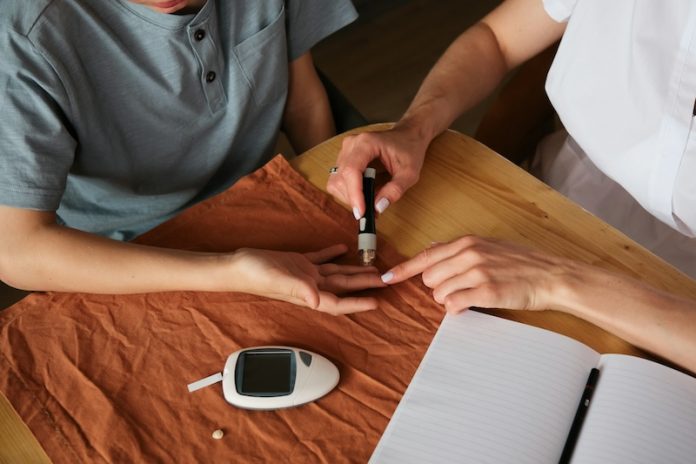
High blood pressure and diabetes are two common health problems that often occur together. Understanding the connection between these conditions can help people manage their health better and reduce the risk of complications.
High blood pressure, also known as hypertension, is a condition where the force of the blood against the walls of the arteries is too high. Over time, this increased pressure can damage the arteries and lead to serious health issues like heart disease and stroke.
Diabetes is a condition where the body either doesn’t produce enough insulin or can’t use it effectively, leading to high levels of sugar in the blood.
There are two main types of diabetes: type 1, which is usually diagnosed in childhood, and type 2, which is more common and typically develops in adulthood.
Research has shown that high blood pressure and diabetes are closely linked. People with diabetes are more likely to have high blood pressure, and vice versa.
In fact, studies suggest that nearly 75% of adults with diabetes also have high blood pressure. But why do these two conditions often occur together?
One reason is that both high blood pressure and diabetes share many common risk factors. For instance, being overweight or obese significantly increases the risk of both conditions. Excess body fat, especially around the abdomen, can lead to insulin resistance, a hallmark of type 2 diabetes, and can also contribute to high blood pressure.
Lack of physical activity is another shared risk factor, as it can lead to weight gain and make it harder for the body to control blood sugar levels and blood pressure.
Another connection between high blood pressure and diabetes involves the damage both conditions can cause to the blood vessels. High blood sugar levels in diabetes can damage the blood vessels and the nerves that control the heart and blood vessels.
Similarly, high blood pressure can damage the blood vessels over time, making them stiff and less elastic.
This double strain on the blood vessels can accelerate the development of atherosclerosis, a condition where the arteries become narrowed and hardened due to the buildup of plaque. This can lead to serious complications like heart attack and stroke.
Inflammation is another common link between high blood pressure and diabetes. Chronic inflammation, which can result from factors like poor diet and lack of exercise, plays a key role in the development of insulin resistance and high blood pressure.
Inflammation can cause changes in the blood vessels that lead to increased blood pressure and can also interfere with the body’s ability to use insulin effectively.
Genetics also play a role in the relationship between high blood pressure and diabetes. Research has shown that having a family history of either condition increases the risk of developing the other. This suggests that certain genetic factors may predispose individuals to both high blood pressure and diabetes.
Managing both high blood pressure and diabetes is crucial for reducing the risk of complications. Lifestyle changes such as eating a balanced diet, getting regular exercise, and maintaining a healthy weight can help control both conditions.
For people with diabetes, managing blood sugar levels is essential, and this often involves monitoring blood sugar, taking medication, and following a healthy eating plan. Similarly, managing high blood pressure often requires medication, lifestyle changes, and regular monitoring.
Research has shown that controlling blood pressure can significantly reduce the risk of complications in people with diabetes.
For example, the UK Prospective Diabetes Study found that lowering blood pressure in people with diabetes reduced the risk of heart disease and stroke by about one-third. This highlights the importance of managing both conditions together.
In summary, high blood pressure and diabetes are closely linked, sharing many common risk factors and pathways that can lead to serious health complications. Understanding this connection can help individuals take steps to manage their health more effectively.
By making healthy lifestyle choices and working closely with healthcare providers, people with high blood pressure and diabetes can reduce their risk of complications and improve their overall health.
If you care about diabetes, please read studies about the cooking connection between potatoes and diabetes, and low calorie diets may help reverse type 2 diabetes.
For more health information, please see recent studies about protein power: a new ally in diabetes management, and pineapple and diabetes: A sweet surprise.
Copyright © 2024 Knowridge Science Report. All rights reserved.



